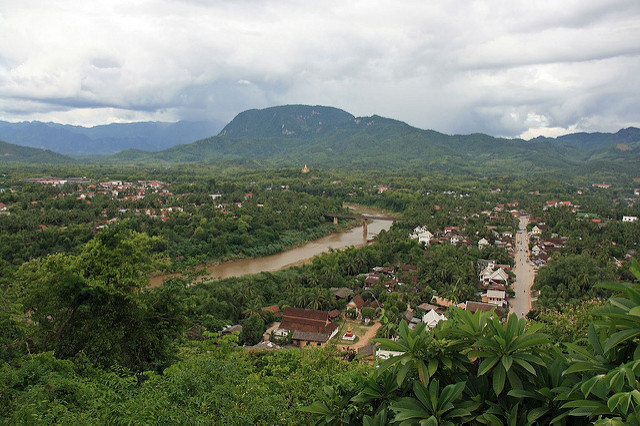 I recently wrote
I recently wrote about Vietnam’s sentencing of a blogger to 10 years in prison, sending another back to France permanently and non-uniformed ‘thugs’ cracking the skulls and assorted bones of many others. Another blogger, Tran Thi Nga, was sentenced to nine years this week. All of those stories got decent—for Vietnam—press coverage, especially the unusually long sentence handed down to blogger
Me Nam (Mother Mushroom), who is well known in the country.
What got less attention is what’s been happening next door, in smaller but still very communist Laos. Three workers in Thailand who came back to Laos to renew their Thai visas were arrested and held in detention last year after posting material offensive to the government on Facebook. They received harsher sentences than
Me Nam. Twenty-nine-year-old Somphone Phimmasone got 20 years and his girlfriend Lod Thammavong 12. Their friend Soukane Chaithad received a 16-year sentence. They also got harsh fines, which
Radio Free Asia (about the only news source to cover the story) says their families cannot pay.
According to what I’ve been told by a reporter at Radio Free Asia, the government had been paying attention to them for a while because of their criticism of human rights, official corruption and even the poor road conditions in the country. The authorities weren’t tipped off by social media—and may not have the ability to monitor all of it anyway. In this case, the three also protested in front of the Lao embassy in Bangkok, a bit of a giveaway.
With less than 10% internet penetration, Laos doesn’t have, or need, the Great Firewall of China or even the capabilities of Vietnam (which has more or less been tracking dissidents to internet cafes for as long as there have been internet cafes). But two years ago it received help in net surveillance from China, also its largest investor. Many of its laws on internet use and public speech are similar to Vietnam’s, and similarly hazy. People must not ‘distort the truth’ or publish material ‘slandering the state, distorting party or state policies, inciting disorder, or propagating information or opinions that weaken the state’. Two decrees have been issued, one in September 2014, and the other, a newly amended media law, at the end of last year. Posting online criticism of the party and government is prohibited.
That’s at least better than the treatment meted out to international worker Sombath Somphone, who disappeared in Vientiane in 2012 after being picked up by the police. Sombath has
never been seen again, despite a huge outcry from the international community and other development workers in Laos. The case was all the more frightening for the fact that he was not particularly critical of the regime or a long-term dissident.
Sombath's case received international attention, but the three workers’ cases haven’t had much coverage. That’s partly because Laos isn’t covered widely to begin with, but also because of structural issues. Compared to Vietnam, it has less local press, fewer international correspondents, less net connectivity and less activism (both within and without the nation—the Lao diaspora can be critical of the government but is far smaller than Vietnam’s). Online activism is low for multiple reasons, including low internet penetration, low literacy levels, and the greater difficulty of using the alphabet online, compared with Vietnam’s diacritic roman one. All of those were issues when I wrote a long report for the
Index on Censorship three years ago, but the government has since drafted more laws and handed down some spectacularly harsh sentences.
Meanwhile, younger people have started using Facebook more and more in the past three years, and though the media landscape hasn’t changed massively (Laos has far fewer newspapers than any neighbouring country), there are now sites and Facebook groups like Tholakhong that will criticise the government at times, albeit obliquely.
This is worth writing about now because Australia and Laos held a human rights dialogue last week (18–19 July) and Human Rights Watch recently
released a report on Laos’ human rights record and five areas it believed Australia should concentrate on (freedom of speech, enforced disappearances, freedom of religion, drug detention centres, and women’s and girls’ rights). Whether that advice was heeded isn’t known, as neither side has made any public statement about the meeting. That’s not an exception;
we do it with Vietnam too (although last year Australia released a statement on Vietnam’s human rights record and areas in which it could be improved). Nothing public has come out of the Laos meeting yet, and there’s not even a mention of it on the embassy website.
Between three far larger neighbours, Laos often gets forgotten, and the story that gets regular attention is the large hydrodam project on the Mekong, to the vocal despair of Vietnam, which considers its relationship with Laos as special. Officially, they are ‘traditional friends’. Similarly, Chinese influence overshadows many other equally important Laotian stories, especially at the
ASEAN foreign ministers’ meeting last year. The spotlight stays on Vietnam’s human rights record, but much of the time there’s barely a flicker in the Land of a Million Elephants. When 20-year sentences are handed out for Facebook posts, that shouldn’t be the case.
 Print This Post
Print This Post